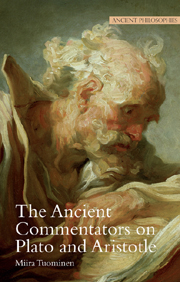Crossref Citations
This Book has been
cited by the following publications. This list is generated based on data provided by Crossref.
2009.
Books Received.
Philosophy,
Vol. 84,
Issue. 3,
p.
469.
Rogers, Dallas
2012.
Research, Practice, and the Space Between.
Cultural Studies ↔ Critical Methodologies,
Vol. 12,
Issue. 3,
p.
242.
Tuominen, Miira
2012.
Philosophy of the Ancient Commentators on Aristotle.
Philosophy Compass,
Vol. 7,
Issue. 12,
p.
852.
Rogers, Dallas
2013.
The Poetics of Cartography and Habitation: Home as a Repository of Memories.
Housing, Theory and Society,
Vol. 30,
Issue. 3,
p.
262.
Trapp, Michael
2013.
A Companion to Plutarch.
p.
43.
Bett, Richard
2015.
Why Care Whether Scepticism is Different from Other Philosophies ?.
Philosophie antique,
p.
27.
Dixit, Uday Shanker
Hazarika, Manjuri
and
Davim, J. Paulo
2017.
A Brief History of Mechanical Engineering.
p.
47.
Muratori, Cecilia
2017.
The body speaks Italian: Giuseppe Liceti and the conflict of philosophy and medicine in the Renaissance.
Intellectual History Review,
Vol. 27,
Issue. 4,
p.
473.
2019.
How to Be a Pyrrhonist.
p.
226.
2019.
How to Be a Pyrrhonist.
p.
189.
2019.
How to Be a Pyrrhonist.
p.
168.
2019.
How to Be a Pyrrhonist.
p.
262.
2019.
How to Be a Pyrrhonist.
p.
244.
2019.
How to Be a Pyrrhonist.
p.
133.
2019.
How to Be a Pyrrhonist.
p.
3.
Bett, Richard
2019.
How to Be a Pyrrhonist.
2019.
How to Be a Pyrrhonist.
p.
24.
2019.
How to Be a Pyrrhonist.
p.
46.
2019.
How to Be a Pyrrhonist.
p.
209.
2019.
How to Be a Pyrrhonist.
p.
108.





